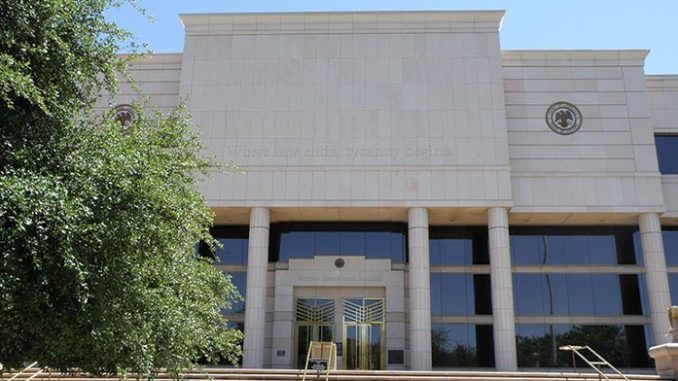
A Mohave County man who works as a police marshal in Utah and has been trying to become certified as peace officer in Arizona since 2016 is asking the Arizona Supreme Court to get involved in his dispute with the board that certifies all peace officers in the state.
Taylor E. Barlow was working for the Hildale (Utah) Marshal’s Office when he first applied for certification with the Arizona Peace Officer Standards and Training (AZPOST) board. His certification would have been held by the Colorado City (Arizona) Marshal’s Office, which operates with the Hildale Marshal’s Office to provide services to the sister towns along the Arizona-Utah border.
Dual certification of officers who are based near state borders is a common practice due to the frequent need to cross state lines for call responses and investigatory actions. And in this case, Barlow actually lived on the Arizona side.
According to court records, Barlow’s initial 2016 application was withdrawn after questions arose about his conduct as a minor. He later reapplied to AZPOST in 2017 but was denied certification, leading to two appeals and now a petition for review filed last month with the supreme court.
In his AZPOST applications, Barlow admitted his involvement in a burglary in 2004 when he was 14, as well as consuming alcohol and participating in a vehicle theft in 2007 while still a minor. He also disclosed that he purchased a small amount of marijuana in Utah and transported it to Arizona when he was 18 or 19-years-old.
But instead of smoking the marijuana as initially planned, Barlow either gave it or traded it to someone. Accounts of the incident have varied in the decade since, leaving it unclear whether he profited financially or not, although one AZPOST document notes at most Barlow may have netted $50.
When Barlow reapplied in AZPOST he included a specific request from the chief marshal who oversees both Hildale and Colorado City to have Barlow’s admissions excused under AZPOST’s “juvenile indiscretion” exception. Such exceptions are common but are reviewed by the board on a case-by-case basis.
However, the AZPOST board voted in December 2017 to deny Barlow’s second application due to his admission of the marijuana sale which would have occurred in 2008 or 2009. AZPOST rules state no applicant should have committed a criminal offense as an adult in the prior 10 years, although the board has authority to waive that rule.
The matter then went before an administrative law judge who decided in April 2018 that Barlow’s 2004 and 2007 actions as a juvenile could be excused, as could his “experimental” possession of marijuana as a young adult. But the judge’s findings noted the act of selling marijuana was a legitimate disqualifier even though the AZPOST board could have certified Barlow anyway.
With the law judge’s findings in hand, AZPOST voted again to deny Barlow’s application. Maricopa Superior Court Judge Patricia Starr upheld that ruling in early 2019 after which Barlow appealed to the Arizona Court of Appeals – Division One in Phoenix.
On March 17, the appellate court agreed with Starr’s finding that AZPOST’s denial was not “arbitrary, capricious, or an abuse for discretion.” The 3-0 vote did not address the merits of the board’s decision in denying Barlow a certification.
As a last hope, Barlow has filed a petition for review with the Arizona Supreme Court. The high court is expected to decide sometime this summer whether to hear the matter or not.
